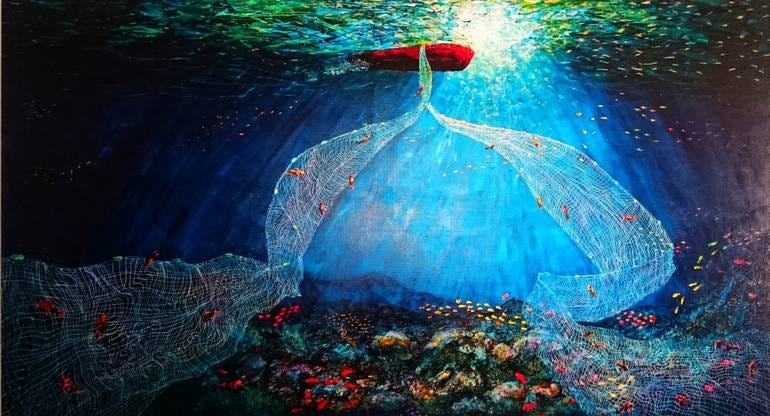On Hope
How Crisis Clarifies
n.b. Welcome to the forty-five people who have subscribed to White Noise since my last note! If you have yet to do so, I invite you to visit my about page to understand the purpose of these writings.
n.n.b. As a result of COVID’s collective wake up call, we are in the midst of two titanic labor market shifts — The Great Resignation and The Great Recalibration. In short, there has never been a better time for individuals to harness and forge ahead with their entrepreneurial ambition. Shopify President Harley Finkelstein said it best: “The cost of failure is as close to zero as it's ever been in the history of the world.”
As such, this issue of White Noise is brought to you by the good people at Day One.
Day One supports modern business builders — those individuals who are building businesses alongside their full-time jobs, launching “calm companies” instead of rocket ships, and leaving the comfort of corporate life for the fulfillment that comes from ownership, agency, and autonomy.
Applications for their intimate, four-week Idea Activator—a program designed to help builders become unstuck as they launch their new business—have just opened.
Above: Hope—that radiant light which penetrates the dark depths of ignorance and disbelief. | The Long Net by Stjepko Mamic
Though I took four years of Latin in high school, I don’t remember very much of it. Unsurprisingly, the conjugations and declensions have not stuck with me; neither have the parts of speech nor the horrid verbal construction that is the passive periphrastic.
Instead, it is the mellifluous quotes and sage maxims from the likes of Seneca, Cicero, and Virgil that have permanently bored into the furrows of my brain.
After too many days spent hunched over my tattered copy of Wheelock's Latin, one phrase—more than any other—has remained with me and become a personal motto of sorts:
Dum spiro spero. | While I breathe, I hope.
Sadly, like most resonant quotes, this is much easier said than done. After all, recent history has doled out a long, eventful couple of years.
Suffering seems both proximate and widespread, acute and generalized. From COVID-19 to countless crises, wildfires to wars, inflation to (potential) invasion, dismal news crowds out those unexpected intrusions of beauty that ought to speckle our days.
As the quantity and quality of this misfortune continues to compound, it can be hard to hold fast, to grasp onto that small but sturdy virtue we need the most: hope. Though four short letters, the plainness of this word belies its depth and promise. After all, the simplest things in life are often the most profound, visceral, and true.
Hope stands alone as ballast of life — that stolid, steady force that turns crisis into reckoning, trouble into opportunity, obstacle into way forward. It keeps every man, woman, and child upright despite the crushing, interminable blows of fate and fortune. As a favorite German philosopher of mine—Josef Pieper—wrote in his Anthology:
All hope says: it will be good, it will end well—with creation, with man, also with me.
Ironically, hope tends to alight on our very worst days. It shines most brilliantly when things are dark and dire. For, it often takes a true, abject crisis to rouse us from quotidian monotony; to awaken us to that miracle we take for granted: existence, itself.
Difficulty, disaster, and adversity inspire resilience and replenish will. After all, we are most grateful for our health after a bout of illness, for our safety after a dangerous encounter, for our very life after a close brush with death. Our comeuppance becomes our catalyst—suffering of all kinds attracts support that in turn showcases the tremendous, omnipresent good that exists in the deep, meaningful relationships that constitute our very world.
Just as a writer betrays their craft if they do not push themselves, a person shirks their potential if they do not hope. Hope promises that whenever we are swept up by the whirlwind of tragedy, we will persist and resist, that we will not be found wanting.
And so, as we enter the Christian season of Advent, that time of expectant waiting and hardy preparation, a brief poem on this beautifully necessary virtue.
On Hope
Hope does not linger or lurk, sputter or flout.
It does not lie dormant or still, prowl or pull punches.
Rather, like the lithe rabbit or perched sparrow, here it leaps. There it bounds.
It moves, shakes, stirs, rumbles—turning potential into kinetic, winter into spring, barren into fertile.
It is ever-moving and ever-present, every-ready to do that natural, new thing.
It shines light into dim tunnels and wrings color from every grayscale.
It has no such thing as an after. It is now, immediate, ubiquitous.
It is abundant wellspring, that which allows all to amor fati.
Life shrinks or expands in proportion to it—
There is no hope without life; no life without hope.
It is bold and bright and true, making all as it should be—then, now, forever.
Alighting on the right person, in the right place, at the right time.
It is everlasting and eternal and iridescent and obtains all things.
No matter what may begin, come, or end.
Per my about page, White Noise is a work of experimentation. I view it as a sort of thinking aloud, a stress testing of my nascent ideas. Through it, I hope to sharpen my opinions against the whetstone of other people’s feedback, commentary, and input.
If you want to discuss any of the ideas or musings mentioned above or have any books, papers, or links that you think would be interesting to share on a future edition of White Noise, please reach out to me by replying to this email or following me on Twitter.
With sincere gratitude,
Tom


